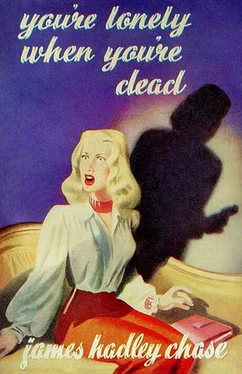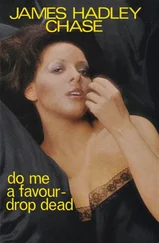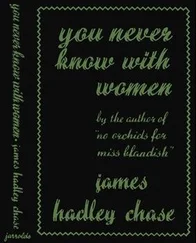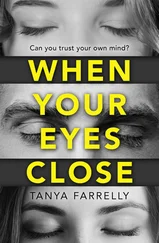I went on like this, turning the facts over in my mind, trying to make them fit into the jigsaw, and getting nowhere until I pulled up outside my cabin.
It was quite a change to find the place in darkness. I turned on the light after unlocking the front door and walked heavily into the sitting room. The clock on the mantel showed one-fifteen. I was tired enough to go to bed with my clothes on.
As I walked into my bedroom the telephone began to ring. In the quiet of the night the bell sounded loud and hysterical. Cursing softly I sat on the edge of the bed and picked up the receiver.
It was Pat Finnegan, and he sounded excited.
‘I’ve found him, Mr. Malloy,’ he said. ‘He’s holed up with Joe Betillo, and he’s there right now.’
I stiffened to attention.
‘You mean Thayler?’
‘Yeah. Do you want me to come over?’
‘You go to bed,’ I said, and patted my pillow regretfully. ‘This is something I can handle on my own. Thanks for the tip, Pat.’
‘Now wait a minute, Mr. Malloy. You can’t go out there alone,’ Finnegan said excitedly. ‘Betillo’s a mean guy to monkey with. You want to be careful of him.’
‘Forget it, Pat,’ I said. ‘Do me a favour, will you? Call Frisco and tell Kerman to come back by the first plane. Tell him where Thayler is.’ I gave Mike the telephone number of Kerman’s hotel. ‘You leave Joe and Thayler to me.’
‘But, look, Joe’s a mean guy...’ Finnegan began, but I cut him short.
‘So am I. Go to bed and so long,’ and I dropped the receiver back on its cradle, gave my pillow one more regretful pat and went out to the car again.
I knew Joe Betillo well by sight and reputation. He was a mortician and embalmer, coffin maker, abortionist and fixer of knife and bullet wounds with no questions asked, and owned a double-fronted shop in Coral Gables, the Dead-End district of Orchid City. The shop was at the far end of a cul-de-sac alley alongside Delmonico’s bar, which dominated the waterfront and faced the harbour.
Coral Gables, the farthest extension west of Orchid City, was a shack town that had grown up around the natural deep-water harbour where an industry of sponge and fish docks, turtle crawls and markets provided a living for the tough boys of the district. It was a tough spot where cops patrolled in twos, and a night seldom passed without someone getting a knife in his hide or his head broken by a beer bottle.
As I parked the car in the shadows, a few yards from the brightly lit entrance of Delmonico’s bar, the clock on the dashboard showed one-forty-five. A mechanical piano was going: thumping out tinny jazz. The waterfront was deserted. Even for Coral Gables, one-forty-five a.m. was bedtime.
I got out of the car and walked to the mouth of the alley leading to Betillo’s place. I could see through the bar windows a few stragglers lounging up at the bar, and a couple of girls in halters and shorts sitting at a table by the door, looking with exhausted eyes at the lights shining on the oily water in the harbour.
Keeping in the shadows I moved quietly down the alley that was as dark as a homburg hat and smelt of stale whisky, cats and rotting fish. I turned a sharp corner in the alley and came upon Betillo’s shop: a two-storeyed job made from salvaged lumber, bleached white by the sun and the wind, shabby and uncared for, and in total darkness. There was a five-foot fence adjoining the building, and after a quick look around to make sure no one was watching, I caught hold of the top of the fence and swung myself over.
I landed in a big yard full of timber, sawdust and wood shavings. Splashes of moonlight, broken by neighbouring roofs, provided light and shadows, and I hadn’t much fear I would be seen if anyone looked out of the windows.
I sneaked across the yard, keeping in the shadows, on the lookout for a window. I found one at the rear of the building within easy reach and fastened only by an inside slip catch. I levered the catch back, forced the blade of my knife between the sill and the frame and raised the window. It went up without noise. I took my time, pushing it up inch by inch until I had space enough to crawl through. I flicked on my flashlight to see where I was going. The round, bright beam lit up an unfurnished room, its floor covered with wood shavings and sawdust. I swung my leg over the sill and climbed quietly into the room.
A door by the window gave on to a passage, and at the end of the passage was a flight of stairs, and facing the stairs was another door. I took all this in with one brief glance and a flash or two of my light.
Before I moved out of the shelter of the room I was in I turned off my flashlight and stood listening. The shop and the apartment above was as quiet and as dark as a coal mine on a Sunday. I crept down the passage; using the light only when I had to, pushed open the door facing the stairs and peered into what seemed a big room, the far side of it stacked high with coffins. The first thing I noticed was the sweet sharp smell of formaldehyde, the stuff you pickle corpses in.
I slid into the room, closed the door and swung the beam of my light around the walls. There were about three dozen coffins stacked against the wall facing me: cheap, pinewood jobs that looked as if they had been knocked together in a hurry. Along the wall on my right were three better class ones: one a real humdinger in black ebony with silver handles. In the centre of the room was another even more gaudy effort in walnut with gold handles. In another corner of the room was a long marble slab with a deep sink close by where I guessed Betillo tidied up his corpses.
I poked around, lifting coffin lids, peering here and there, and feeling spooked, not knowing what I was looking for, but hoping I’d strike something. Eventually I did.
I had got around to the stack of coffins against the far wall: the cheap, pine jobs. The second of the three I looked into contained Anita Cerf.
I was half expecting to find her somewhere in the room, and had tensed my nerves for the shock of seeing that blood-framed face again. But in the hard, bright light of the torch she looked even more horrible than I had imagined. Betillo had embalmed her just as she was: he hadn’t attempted to tidy her up or fill in the hole in her forehead or even wash the blood from her face. The sight gave me a turn, and before I could control my jumping nerves, I dropped the coffin lid with a crash that sounded like a thunderclap in my ears.
I stood listening, my heart hammering and my mouth dry. Nothing happened. I was suddenly aware that I hadn’t a gun, and if I were caught here it would be easy enough for Betillo to stick a knife into me and sling me into the harbour, or if he didn’t want my body to be found, he could embalm me and keep me in one of his boxes for the next twenty years. The thought made me sweat, and I decided to get out quick and watch the joint from the alley until Kerman arrived with his gun.
As soon as I made this decision I couldn’t get out of the place fast enough. I tiptoed to the door. As I put my hand on the doorknob I felt it turn in my grasp. That sent my blood pressure up and my heart into my mouth. Someone out in the passage was coming in!
I snapped off my light, took three quick, silent steps back, away from the door, and waited. The room was now pitch dark, and the close, suffocating smell of the formaldehyde bothered me. I listened, holding my breath, peering into the darkness, waiting for something to happen.
There was a long, ghastly silence. The only sound I could hear was the dull thumping of my heart and the faint whisper of my controlled breathing. Then a board creaked close to me. Whoever it was who had come into the room must have had eyes like a cat. He was coming straight at me as if he could see me. The first warning I had of his nearness was a sudden increase of darkness as his form loomed up, and then before I could dodge, a pair of cold, hard hands shot out of the darkness and grabbed at my throat.
Читать дальше







![Джеймс Чейз - Safer Dead [= Dead Ringer]](/books/430347/dzhejms-chejz-safer-dead-dead-ringer-thumb.webp)
![Питер Джеймс - Wish You Were Dead [story]](/books/430350/piter-dzhejms-wish-you-were-dead-story-thumb.webp)



